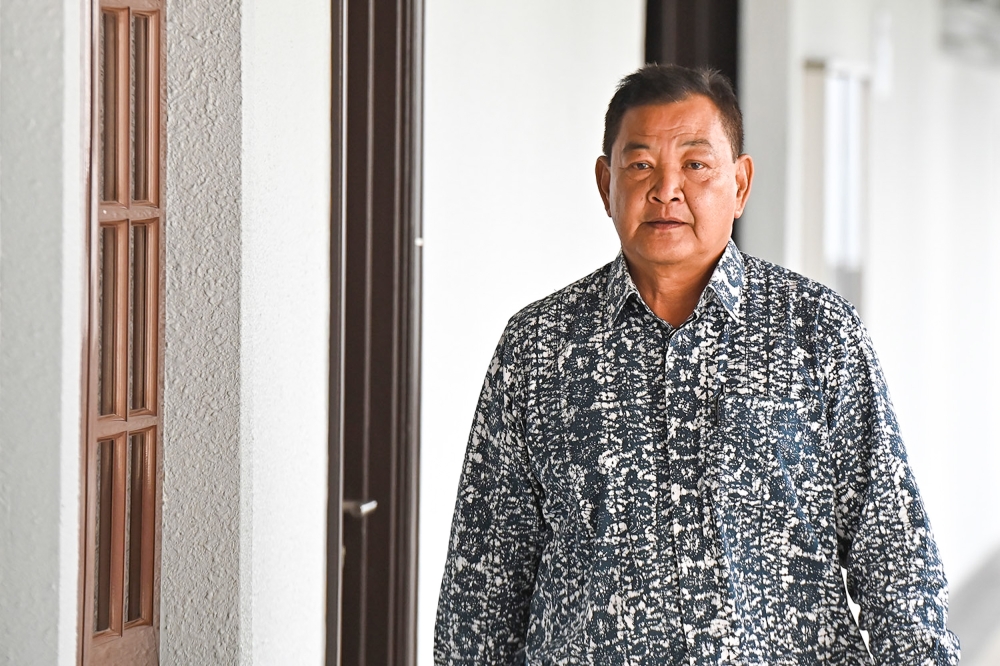KUALA LUMPUR, Feb 5 — Malaysia’s former top law enforcer Tan Sri Hamid Bador conceded in court today that that he had no personal knowledge of the exact location of M. Indira Gandhi’s ex-husband Muhammad Riduan, who was wanted for absconding with their youngest child Prasana Diksa in 2010.
The retired inspector-general of police was named as one of four defendants in the civil suit Indira filed on October 28, 2020 against the police, the Home Ministry, the chief of police, and the Malaysian government whom she accused of failing to comply with a May 30, 2014 order from the High Court in Ipoh, Perak to arrest her ex-husband and reunite her with Prasana Diksa whom she last saw as an 18-month-old.
Muhammad Riduan was formerly known as K. Pathmanathan before his conversion to Islam.
Hamid also failed to produce any proof or documents to back up claims that the Royal Malaysia Police had done all it could to find the missing girl when he was its top official, as instructed by a court mandamus order.
Hamid served as Malaysia’s 12th IGP from May 4, 2019 to May 3, 2021.
Under questioning from Indira's lawyer Rajesh Nagarajan, Hamid was asked why he said several years ago that he wished for a happy ending to this saga while alluding to knowing the whereabouts of Muhammad Riduan.
Rajesh: Based on your witness testimony you said the police made concerted efforts to locate Pathmanathan. Can you please provide us with the warrant that was issued, the updated wanted list, the Interpol request to put him on the red notice and anything else that was done to locate him, Tan Sri?
Hamid: No, I can't. At the time I made those comments I based it on information I got from the officers, the investigation unit and the briefings I got from the teams.
Rajesh: You also said you had information that he was moving about, changing locations. This too was personal knowledge?
Hamid: No, just from briefings.
Rajesh: You said you had help from Interpol, can you confirm contacting Interpol today in the court and do you have any documents to back these claims?
Hamid: No, I was briefed about it.
Rajesh: So this line in the witness statement is wrong, it's the department that was briefed, not you?
Hamid: Yes.
Rajesh: If so, then I suggest to you that there is no proof today in this court to show the police knew his location at the time?
Hamid: Agreed.

In 2021, Hamid accused several local non-government organisations (NGOs) of pressuring him and the RMP to find Prasana Diksa and claimed it hampered their ability to conduct their duties properly.
At that time, he was about to retire and said that any ongoing police effort to get Muhammad Riduan was being thwarted due to interference by civilians and the NGOs, adding that this drove the wanted man to flee abroad.
In her suit, Indira, now 49, alleged that the then IGP had deliberately and negligently disregarded a mandamus order issued by the Federal Court on April 29, 2016, in failing to investigate or take appropriate action to return her daughter, Prasana Diksa, who is now 18 years old, to her.
Indira claimed that all the four named as defendants had a role to play in making decisions or ordering the police to execute the committal warrant against Muhammad Riduan as ordered by the Federal Court.
She contended that the behaviour of all the defendants had directly caused Muhammad Riduan to flee and lengthened her separation from her youngest daughter until today.
The second person called to testify today was Assistant Superintendant Yap Siew Cheng from the Ipoh Criminal Investigation Unit. She was the investigating officer who took on the search for Prasana Diksa on November 13, 2020.
Like Hamid, Yap was unable to produce documents to prove that she and her unit had done the necessary in trying to locate and arrest Muhammad Riduan.
Indira’s lawyers asked Yap what she had done to locate Muhammad Riduan.
She replied that she had gone to his last known addresses in Ipoh and Kelantan to find him, but he was not there.
It was then reported that in March 2014 Pathmanathan had fled the country.
Rajesh: So you said he had been moving around and Immigration said he was nowhere to be found, but later in March 2014 it was said he had fled the country, yes?
Yap: Yes, correct.
Rajesh: So if he had left the country in March, why were you still looking for him. No answer? Well, I put it to you the police didn't do a proper job and did a sham investigation.
Yap: I disagree.
Rajesh: Then can you provide us with your diary of progress on this investigation?
Yap: Yes, I have it here.
But before Yap could hand over her diary of the investigation, senior federal counsel Andi Razalijaya A. Dadi who was representing the four defendants, objected.
He asserted that the diary was a confidential document.
Judicial Commissioner Datuk Raja Ahmad Mohzanuddin Shah Raja Mohzan who was presiding later noted the objection and ruled that the diary did not need to be submitted to the court.
Raja Ahmad then set March 25 for the lawyers from both sides to submit in writing, and May 7 for oral submissions.



















